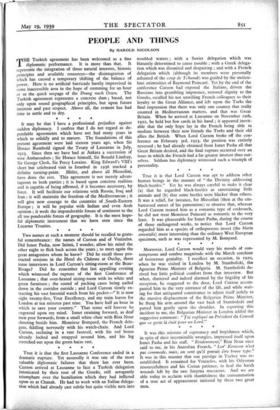It may be that I have a professional prejudice against
sudden diplomacy. I confess that I do not regard as de- pendable agreements which have not had many years in which to solidify and to mature. The foundations of this present agreement were laid sixteen years ago, when Sir Horace Rumbold signed the Treaty of Lausanne in July, 1923. Since then we have had at Ankara a succession of wise Ambassadors ; Sir Horace himself, Sir Ronald Lindsay, Sir George Clerk, Sir Percy Loraine. King Edward's VIII's short but celebrated visit to Istanbul in 1936 marked a definite turning-point. Hitler, and above all Mussolini, have done the rest. This agreement is not merely advan- tageous to both parties ; it is based upon concrete realities and is capable of being affirmed, if it becomes necessary, by force. It will facilitate our relations with Russia, Iraq and Iran ; it will maintain the freedom of the Mediterranean ; it will give new courage to the countries of .South-Eastern Europe ; it will be popular with Indian and even Arab opinion ; it weds the imponderable forces of sentiment to the all too ponderable forces of geography. It is the most hope- ful diplomatic instrument that we have seen since the Locarno Treaties.


















































 Previous page
Previous page